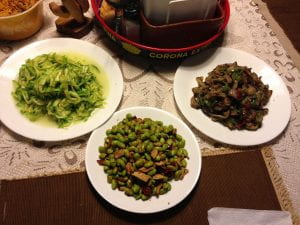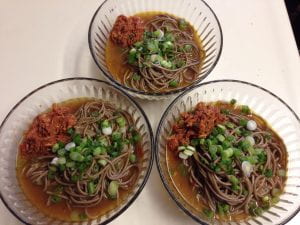While there are plenty of reasons to go vegan, there seem to be even more excuses to not go vegan. One such excuse is that eating meat is essential to some cultures and traditions. I often hear people say, “Eating meat is just such a big part of my culture.” I used to say so myself, until I could no longer live with the inconsistency between my values and actions: I said I loved animals, but I was still causing animal suffering by consuming animal products. Something had to change.
My fondest memories of growing up in central south China are visits to my grandparents’ house in rural Yiyang. On their farm I first observed how my favorite vegetables grow. I learned that the best chickens eat a diet of grains supplemented with worms and vegetables they forage while roaming freely on hills shaded by bamboo forests. The most robust ones could fly; they were the meatiest and tastiest, giving an intense umami flavor when made into chicken soup. I found joy in chasing piglets around. I somehow also learned to celebrate the annual pig slaughter for Chinese New Year—perhaps because I was supposed to.
Fresh harvested spinach from my grandparents’ garden.
The importance of pigs in Chinese culture cannot be understated. “家” (pronounced “jiā”), the Chinese character for “home” was created by adding the roof radical (宀) to the pig radical (豕). Figuratively, a roof over a pig makes home in Chinese culture. For thousands of years, the Chinese raised pigs primarily as a source of manure to fertilize the land for grain and vegetables. Pork was a rare treat for special occasions. That has changed. Over the last four decades, pork production and consumption has skyrocketed in parallel with China’s economic development. Whether it is a symbol of home or a measure of progress, pigs have retained their primacy in Chinese culture.
When I came to the United States for high school, I bonded with my host family as we fused Mexican and Chinese gastronomic traditions together. I took pride in coming from Hunan, a province famous for its mouthwatering spicy specialties such as steamed fish head with red chili and stir-fried green peppers with pork. I worked to recreate the taste of home while being thousands of miles away, both for a sense of connection with Hunan and to deepen my bond with my host family as we shared our life stories around the dinner table.
Mexican-Chinese fusion: Chinese dishes served with Mexican rice.
Mexican-Chinese fusion: improvised buckwheat noodle soup topped with red chili pork from making Christmas tamales.
Everything started to change after I took an environmental ethics class. I left that class with a head full of questions: Is it moral for humans to kill other animals and inflict suffering upon them merely for our taste pleasure? Does culture justify such killing and suffering? If killing pigs could be justified by my culture, is it okay to kill dogs because it’s traditional in some places? Just because something has been done for a long time or by many people does not mean it is the right thing to do.
What about eggs and dairy? Egg-laying chickens and dairy cows are often subject to cruel treatments including confinement, debeaking, forced impregnation of cows, and separation of newborn calves from their mothers. Their bodies have been transformed into small factories. Males chicks are killed soon after hatching because they can’t lay eggs. Male calves are either killed or raised to produce veal. Chickens and cows are destined to be slaughtered when they stop being productive.
Despite knowing that eating animal products caused these morally unjustifiable harms, I still tried to find excuses to maintain the status quo. I conformed to the norm, because I was afraid of being alienated from both my newfound community in the United States and my ties to China. I did not want to confront or inconvenience those around me who enjoyed animal-based dishes in our food culture.

Chinese New Year celebration feast at home. 7 of the 11 dishes have animal products.
But what exactly does it mean to connect to one’s culture through food? In today’s food systems, the complex processes that mediate our relationship with food encompass institutional arrangements and political strategies. Take dairy in China for example. Milk had never been a staple in Chinese food until 30 years ago. Even though 90% of Chinese are lactose intolerant, China’s thirst for milk continues to rise thanks to political and economic interests pushing campaigns to build a strong, modern Chinese population. The story behind skyrocketing pork consumption is similar.
What has been forgotten is that China has a long tradition of vegetarianism that dates back as early as 1000 B.C. Records mentioning imitation pork and mutton dishes date back to the 600s, revealing the centuries-old art of making plant-based meat long before the surge of Beyond Meat or Impossible Burger. When we talk about connecting to our cultures and traditions through food, how far back in history are we talking about?
As I thought more about the production of animal products, I couldn’t help but see dead animal bodies every time I saw meat, eggs, and dairy. Eventually, I overcame my resistance to change and did what my morals urged me to do. I stopped eating animal products to minimize unnecessary animal suffering and to boycott the commodification of other living creatures.
The bonuses of the change were many. The environmental footprint of my diet was reduced. An adequate whole-food, plant-based diet has been the most healthful way of eating I have experienced.
After going vegan, my family and I found new ways to enjoy food together. After all, there are plenty of plant-based dishes in our cuisine. My change has also introduced us to a whole new world of culinary possibilities and taste sensations. Showing each other respect for our different food choices has even deepened our relationships.

Home-cooked Hunan style plant based food.
Having lived abroad for eight years, I know firsthand the longing for the familiar. I know how disappointing it can be to tell your parents you no longer choose to eat your favorite home-cooked meals. But unless your current diet is composed of 100% animal products, going more plant-based will not mean abandoning the food culture you share with your loved ones entirely. Don’t let culture tie you down to killing animals and consuming animal products. Cultures evolve. Your way of life can too.


